Many travellers feel that no Thailand adventure would be complete without an elephant trek. The sad fact is that many elephants are overworked, underfed and mistreated at tourist-driven attractions, and their backs are not suited to carrying people for long stretches. In an idyllic slice of Kanchanaburi province, however, Elephant's World is a non-profit elephant refuge that offers a fun and responsible alternative to the usual tourist elephant camps.
Elephant rides at Ayutthaya, Pai and Phuket (among many other places) are some of the most popular tourist activities in Thailand. It may seem innocent enough, but an elephant is not a horse. While their powerful necks can support a mahout with ease, bearing a load of more than 100 kilos at a time places an immense strain on their backs -- and stress on their sensitive minds. Even if owners provide a balanced diet, which many do not, the long hours can lead to malnutrition as there's simply not enough time for the elephants to eat and drink.

Elephant's World: where you can work for the elephants.
Though logging was officially outlawed by the Thai government in 1989 due to the destruction of some three quarters of the country's forests, many elephants are still illegally used for pulling heavy timber up rugged hills. Worse yet are the "begging elephants" that are forced to "perform" on the streets for pocket change. Thankfully, Bangkok now strongly enforces a ban on this practice, but it remains common in provincial Thai cities.
Created in 2008 by Kanchanaburi veterinary officer, Dr Samart Prasitthiphon, Elephant's World is a non-profit refuge for "sick, old, disabled, abused, illegal and street elephants" that are typically donated or purchased after enduring decades of hard work. After a day at Elephant's World, you'll know the residents by name.
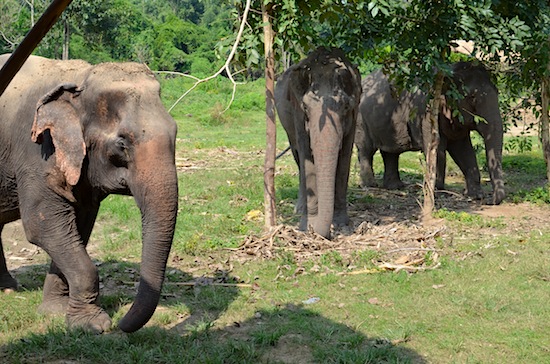
Say hi to Samboon.
There's Malee, a 44-year-old who has walked with a limp ever since she was hit by a truck while begging in Bangkok, while 33-year-old bull, Rom Sai, has an eye that was impaled by a tree branch when he worked in the northern Thai hills. Songkran, aged 74, was so exhausted from decades of carrying tourists in Phuket that she could hardly stand when she first arrived at Elephant's World. Despite the blindness that developed after decades of logging and tourist trekking, 57-year-old Lam Duan is patiently cared for by a long-term Japanese volunteer. These are just a few of the elephants who enjoy a dignified retirement at Elephant's World.
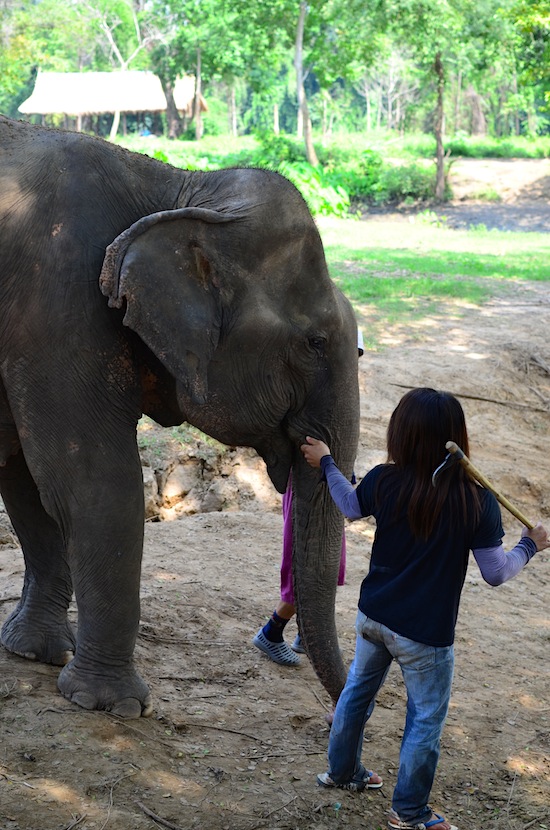
Gently guiding blinded Lam Duan to drink.
With a handful of log cabins, raised wooden walkways, dirt paths and thatched shelters for the animals, Elephant's World has the feel of a harmonious country village. In the shadow of jungle-clad mountains, the River Kwai slides past friendly dogs, goats, chickens and water buffalo that all mingle peacefully with the elephants. Mainly Karen mahouts do their best to maintain a casual order over this motley bunch. Locals stop by often to feed the elephants, help with projects and relax by the river, and volunteers from all over the world stay for a month or more.
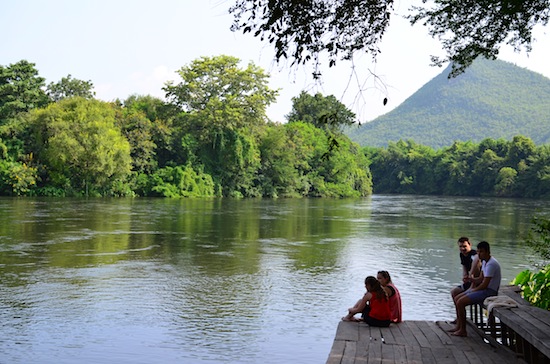
The scenery at Elephant's World is spectacular.
On a one-day visit, the relaxed atmosphere allows visitors plenty of time and space for intimate encounters with the elephants. You'll learn how, just like humans, they each have their own distinct personalities, quirks and favourite foods. Though we've spent brief periods around elephants many times before, it wasn't until our day at Elephant's World that we gained a true sense of their intelligence, playfulness and sensitivity.
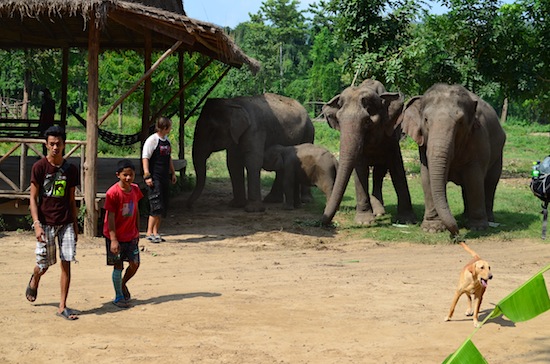
Just hanging around.
Immediately after arriving, our volunteer-guide briefed us on the organisation's mission while offering loads of info on the plight of working elephants in Thailand. She mentioned that, although the mahouts' rods with steel hooks at the end might seem inhumane or violent, they're a necessary tool that the animals have come to respect, just like how a horse respects its reins. Once an elephant and mahout have developed a relationship, a subtle nudge with the rod is all that's needed to get the animal moving in the right direction.
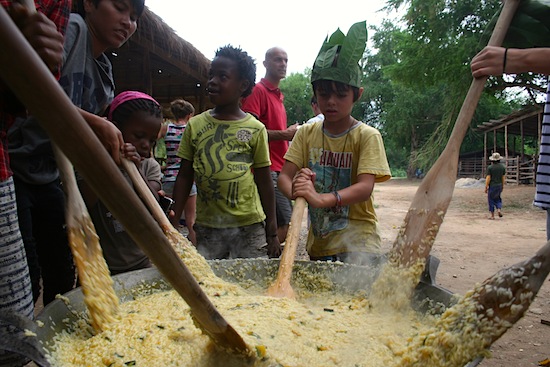
Preparing the sticky rice.
After offering fruits and veggies to several of the elephants, we spent an hour chopping up pumpkins and boiling sticky rice for later. Elephants were showered with hoses, dogs snoozed under tables and water buffaloes peaked out of mud puddles as we enjoyed a relaxing midday lunch on a shaded wooden deck over the river.
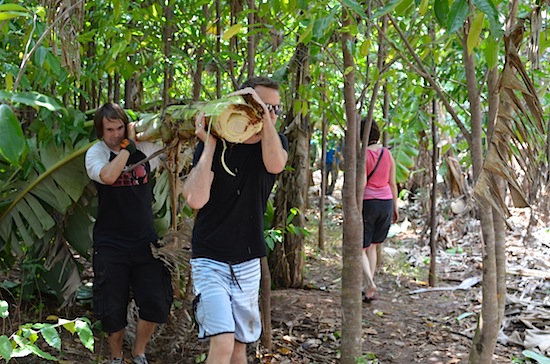
Like we said -- working for the elephants.
Led by volunteers and staff, we then piled into a couple of trucks and drove a few kilometres to a banana grove. Here we used machetes to chop down donated banana trees, carried the dripping trunks through the forest and stacked them onto the bed of a pick-up. The broad leaves dragged along the road as a few brave visitors secured the trees by balancing on top of them for the ride back to camp. Elephants can eat up to 300 kilograms of vegetation per day, we learned, and the trees would be gobbled up by sundown.
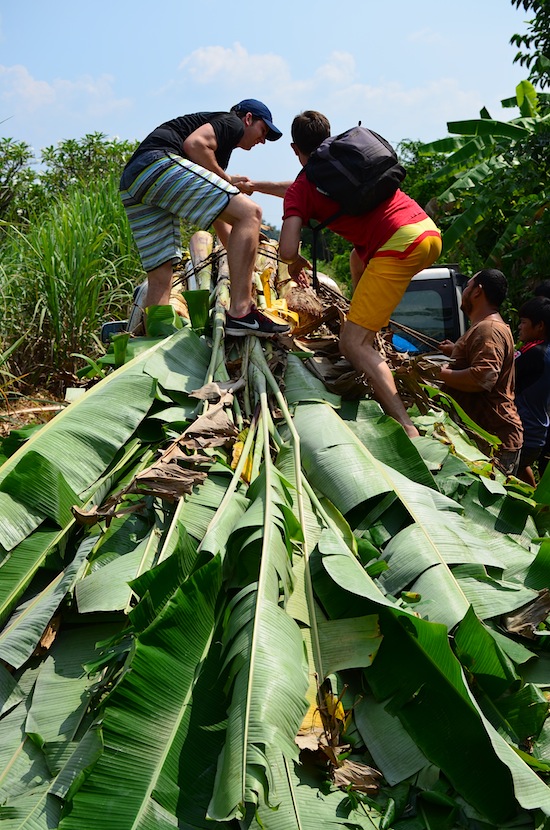
There is a pick-up truck under there.
When we returned, the mahouts shouted boisterous commands as the elephants excitedly crowded around the trucks, which they've come to associate with an afternoon snack. They waited with patience as we rendered the boiled pumpkin and sticky rice into bite-size balls. With a solid hour for them to indulge in this daily treat, there was plenty of time for photo-ops.
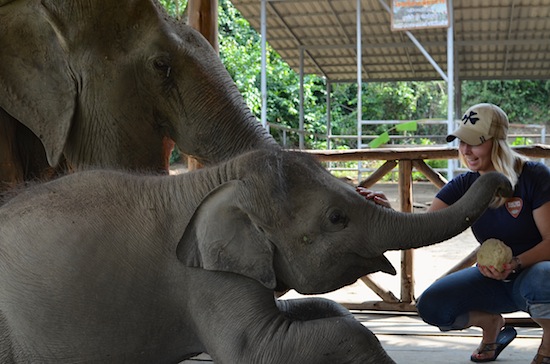
Happy elephants, happy people.
The full-bellied elephants then sauntered in their silent way over to the river, where this time it was us -- the swimsuit-clad visitors -- who did our best to contain our excitement. This part of the program is referred to as the "elephant bath". The animals did receive a good scrubbing, but it reminded us more of a wild pool party.
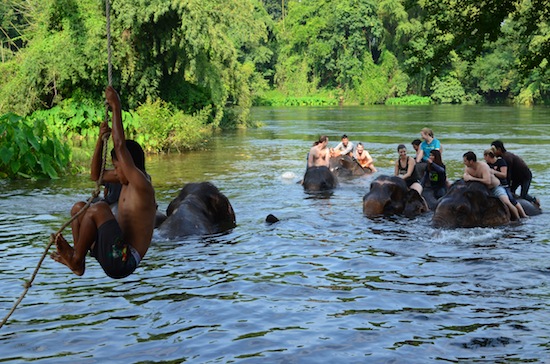
Now for the real fun.
Visitors did their best Tarzan impressions while leaping -- or belly-flopping -- off a rope swing. Courageous kids in life vests bobbed as the animals waded around them. Elephants burst skywards with a thunderous splash that tossed their grinning mahouts aside. Needless to say, this was the highlight of the day.

One excited elephant (and one wet mahout).
When the elephants finally trotted back to shore with the promise of refreshing banana trees, visitors were free to keep swimming, kick back with locals who had arrived to enjoy the late afternoon scenery, or follow the elephants for a final few moments of bonding. Though we were exhausted when our minibus returned to Bangkok that evening, this was a day that we'll never forget.
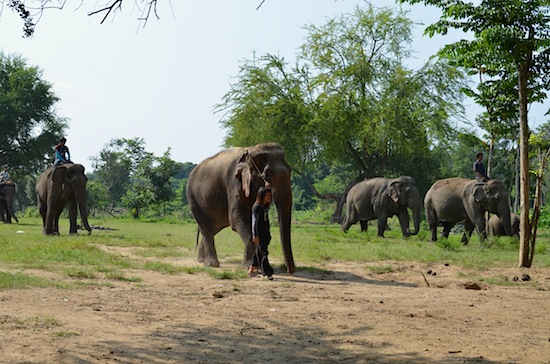
Come and meet the gang!
A one-day visit to Elephant's World runs from 10:00 to 16:00 and costs 2,000 baht per person, including a Thai buffet lunch and pick-up/drop-off in Kanchanaburi town if desired. All money received goes directly to the care of the elephants and related expenses. Even if you can't make it to Kanchanaburi, Elephant's World is a non-profit that's well worth supporting. Donations can be made through their informative website.
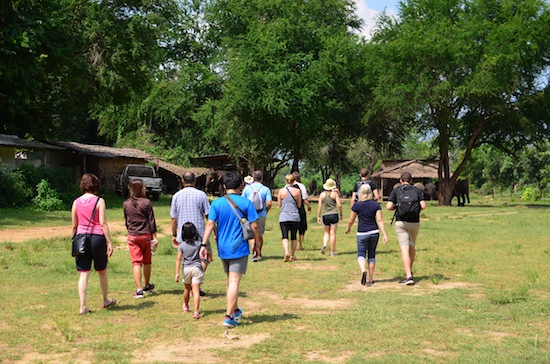
Calling all volunteers.
Elephant's World also needs volunteers on an ongoing basis; those staying for one month are asked to contribute a relatively small fee for food and room-and-board. The organisation has a flexible outlook, so shorter or longer stays are also possible. If you have the time, volunteering is an excellent opportunity to make friends with the elephants and other volunteers, staff and visitors while enjoying a nature-oriented refuge of your own.
Other organisations doing great work for elephants in Thailand include Elephant Nature Park and Patara Elephant Farm, both in Chiang Mai province, and Wildlife Friends Foundation in Petchaburi.
6th photo down courtesy of Elephant's World. 11th photo down courtesy of Chinnapatt Chongtong.